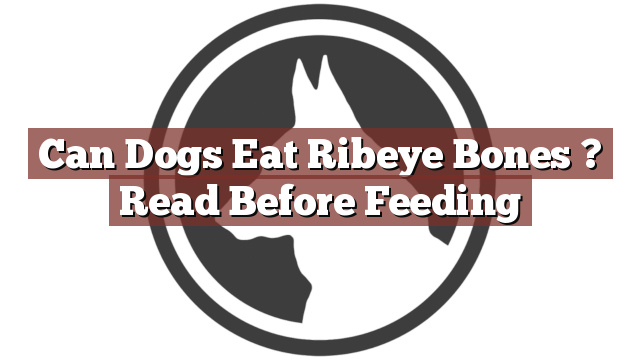Understanding Your Dog’s Dietary Needs
As a responsible dog owner, it is crucial to understand your furry friend’s dietary needs. While dogs primarily thrive on a diet of commercially prepared dog food, some dog owners choose to supplement their pets’ meals with various human foods. However, it is essential to exercise caution and make informed decisions regarding what you feed your dog.
Can Dogs Eat Ribeye Bones? Read Before Feeding
Can dogs eat ribeye bones? This is a question that many dog owners may have when considering sharing a delicious ribeye steak with their four-legged companion. The answer to this question is no. While dogs indeed enjoy chewing bones, ribeye bones can pose serious risks to their health.
Ribeye bones, like other cooked bones, are prone to splintering. These sharp fragments can cause a wide range of injuries to your dog’s mouth, throat, and digestive system. Additionally, chewing on bones can lead to tooth fractures or even broken teeth. It is crucial to prioritize your dog’s safety and avoid feeding them ribeye bones or any cooked bones in general.
Pros and Cons of Feeding Ribeye Bones to Dogs
Feeding ribeye bones to dogs may offer some potential benefits, but the risks far outweigh the advantages. One possible advantage is that chewing on bones can help promote dental health by reducing plaque and tartar buildup. However, this can be achieved more safely with specially designed dental chews or toys that are specifically made for dogs.
On the other hand, the cons of feeding ribeye bones to dogs are numerous. The risks of bone splintering, mouth or throat injuries, tooth fractures, and gastrointestinal obstructions are significant concerns. These issues can result in severe pain, infections, or even life-threatening emergencies that require immediate veterinary intervention. It is always better to prioritize your dog’s well-being and choose safer alternatives for their dental health.
Conclusion: Weighing the Risks and Benefits of Ribeye Bones for Dogs
While dogs may enjoy chewing on bones, it is important to make informed decisions about what you offer them. The risks associated with feeding ribeye bones to dogs are substantial, including bone splintering, mouth injuries, tooth fractures, and gastrointestinal obstructions. The potential benefits, such as dental health improvements, can be achieved through safer alternatives like dental chews or toys made specifically for dogs.
Remember, your dog’s safety and well-being should always be the top priority. It is advisable to consult with your veterinarian for guidance on suitable dietary options for your canine companion. By taking proper care of their nutritional needs and avoiding risky choices, you can ensure a long and healthy life for your beloved furry friend.
Thank you for taking the time to read through our exploration of [page_title]. As every dog lover knows, our furry friends have unique dietary needs and responses, often varying from one canine to another. This is why it's paramount to approach any changes in their diet with caution and knowledge.
Before introducing any new treats or making alterations to your dog's diet based on our insights, it's crucial to consult with a veterinarian about [page_title]. Their expertise ensures that the choices you make are well-suited to your particular pet's health and well-being.
Even seemingly harmless foods can sometimes lead to allergic reactions or digestive issues, which is why monitoring your dog after introducing any new food item is essential.
The content provided here on [page_title] is crafted with care, thorough research, and a genuine love for dogs. Nevertheless, it serves as a general guideline and should not be considered a substitute for professional veterinary advice.
Always prioritize the expert insights of your veterinarian, and remember that the health and happiness of your furry companion come first.
May your journey with your pet continue to be filled with joy, love, and safe culinary adventures. Happy reading, and even happier snacking for your canine friend!

